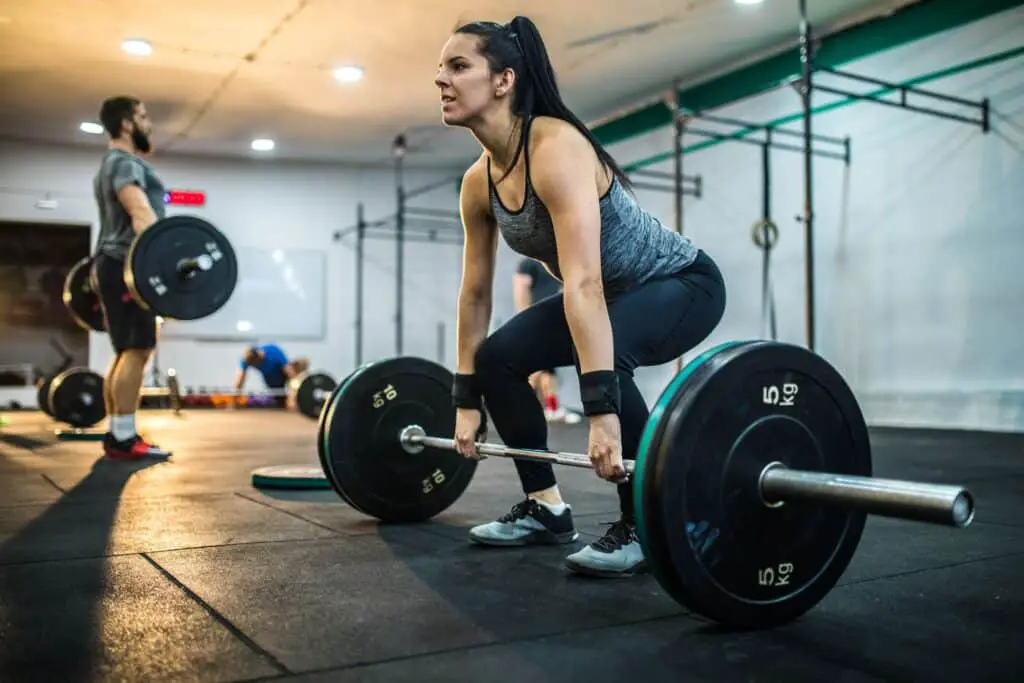Introduction
What To Eat Before Crossfit: CrossFit, a high-intensity, functional fitness program, has surged in popularity over the past few decades, attracting individuals from all walks of life. Whether you’re a seasoned CrossFit athlete or a beginner looking to improve your fitness, one thing remains constant: the importance of nutrition in optimizing your performance. What you eat before a CrossFit session can make a significant difference in your energy levels, endurance, strength, and overall success in the gym.
Think of your body as a finely tuned machine it requires the right fuel to perform at its best. Pre-workout nutrition plays a pivotal role in enhancing your CrossFit experience. It not only provides you crossfit shoes with the energy needed to power through a grueling workout but also aids in muscle recovery and minimizes the risk of injury.
We will delve into the essential aspects of what to eat before CrossFit, exploring the science behind pre-workout nutrition and offering practical tips and recommendations to help you make informed dietary choices. We will address various dietary preferences and restrictions, ensuring that everyone, from carnivores to vegans, can find suitable options to support their CrossFit journey.

What Is Best To Eat Before Crossfit?
A balanced meal of low glycemic carbohydrates and high quality protein is the best choice. For carbohydrates the best foods to consume are fresh fruit like apples, berries, and oranges. For protein try grabbing a 4-6 oz. chicken breast or a shake containing 30 g of quality whey protein.
Choosing the right pre-workout meal or snack before a CrossFit session can significantly impact your performance and overall experience. The ideal pre-CrossFit meal should provide sustained energy, enhance endurance, support muscle recovery, and minimize the risk of digestive discomfort.
Complex Carbohydrates
The foundation of your pre-CrossFit meal should be complex carbohydrates. These slow-digesting carbs provide a steady release of energy throughout your workout. Opt for sources like whole grains (oats, quinoa, brown rice), sweet potatoes, or whole wheat bread.
Lean Protein
Protein plays a vital role in muscle recovery and maintenance. Include a source of lean protein in your pre-workout meal. Options such as chicken breast, turkey, tofu, Greek yogurt, or beans are excellent choices.
Healthy Fats
While you don’t want to overdo it with fats immediately before a workout, a small amount can help sustain energy levels. Consider adding some avocado, nuts, or a drizzle of olive oil to your meal.
Fiber and Micronutrients
Incorporate vegetables and fruits for their fiber and micronutrient content. They provide vitamins and minerals that support overall health and can contribute to sustained energy.
Hydration
Don’t forget to hydrate! Dehydration can lead to reduced performance and increased risk of cramping. Drink water throughout the day leading up to your workout, and consider a small serving of an electrolyte drink if your workout is particularly intense or prolonged.
What Should I Eat Before And After Crossfit?
Pre and post workout meals should include a combination of quality protein, carbs, and healthy fats 1-3 hours before and after sessions. The amounts depend on personal preference and tummy tolerability.
Carbohydrates: Complex carbohydrates are your primary source of energy. Consuming them before CrossFit ensures you have the stamina to power through the workout. Options include oatmeal, brown rice, quinoa, or whole-grain bread.
Lean Protein: Protein is essential for muscle repair and growth. Incorporate lean protein sources like chicken, turkey, tofu, or Greek yogurt to support your muscles during the workout.
Healthy Fats: A small amount of healthy fats can provide sustained energy. Avocado, nuts, or a drizzle of olive oil can be included in your pre-workout meal.
Fiber and Micronutrients: Vegetables and fruits offer vitamins, minerals, and fiber that support overall health. They can provide essential nutrients for your workout.
Timing: Aim to eat a balanced meal 1 to 3 hours before your CrossFit session. This allows for digestion and energy utilization during your workout without causing discomfort.
Can I Do Crossfit On An Empty Stomach?
If your goal is fat loss: you can try to train on an empty stomach and after a process of adaptation you will be able to slightly increase fat burning. It is not to ingest post-workout to take full advantage of the growth hormone raised by training.
Engaging in CrossFit on an empty stomach is a topic that generates some debate among fitness enthusiasts. Whether it’s a suitable practice depends on various factors, including your individual goals, body composition, and personal preferences.
Pros of Doing CrossFit on an Empty Stomach
Fasting Benefits: Some people follow intermittent fasting or time-restricted eating patterns, which involve working out in a fasted state. Advocates suggest that exercising in this state may enhance fat burning, as your body relies on stored fat for energy when glycogen levels are low.
Minimal Digestive Discomfort: Exercising on an empty stomach can reduce the risk of digestive discomfort, such as cramps or nausea, that can occur when you work out shortly after eating.
Cons of Doing CrossFit on an Empty Stomach
Limited Energy: CrossFit is a high-intensity workout that demands substantial energy and stamina. Exercising on an empty stomach may leave you feeling fatigued and less able to perform at your best, particularly during long or intense sessions.
Muscle Preservation: When you exercise without adequate fuel, your body may start to break down muscle tissue for energy, potentially hindering muscle growth and recovery.
Decreased Performance: You might find that your strength, endurance, and overall performance suffer when you haven’t eaten before CrossFit. This could impact your ability to complete workouts as prescribed or achieve your fitness goals.
Best Practices
Timing Matters: If you choose to do CrossFit on an empty stomach, it’s essential to pay attention to timing. Exercising in a fasted state is often more effective when done in the morning after a night’s sleep, as your glycogen stores are lower.
Stay Hydrated: Even if you’re fasting, it’s crucial to stay adequately hydrated before and during your CrossFit workout. Dehydration can impair your performance and increase the risk of injury.
Listen to Your Body: Individual responses vary. Some people thrive on fasted workouts, while others require a pre-workout meal to perform at their best. Pay attention to how your body feels and adjust your approach accordingly.
What Foods Do Crossfitters Eat?
Whether you choose to follow The Zone Diet or not, the general view for an ideal CrossFit diet is that you should ‘eat lots of green vegetables, lean meats, nuts and seeds, little starch, and no sugar.
CrossFitters, like athletes in any sport, prioritize nutrition to fuel their workouts, support recovery, and optimize their overall performance.
Lean Proteins
Protein is essential for muscle repair and growth, making it a cornerstone of a CrossFitter’s diet. Common protein sources include:
Chicken: Lean chicken breast is a versatile and low-fat protein option.
Turkey: Turkey is another lean source of protein that provides essential amino acids.
Fish: Fatty fish like salmon offers omega-3 fatty acids, which have anti-inflammatory benefits.
Lean Beef: Lean cuts of beef, such as sirloin or tenderloin, provide protein and important vitamins and minerals.
Eggs: Eggs are a budget-friendly and versatile source of protein, including valuable amino acids.
Complex Carbohydrates
Carbohydrates are the body’s primary energy source, and CrossFitters need a steady supply of them. Ideal sources include:
Whole Grains: Foods like brown rice, quinoa, whole wheat pasta, and oats offer sustained energy due to their complex carbohydrates and fiber content.
Sweet Potatoes: These provide complex carbs, vitamins, and minerals while helping to maintain blood sugar levels.
Legumes: Beans, lentils, and chickpeas are rich in fiber, protein, and carbohydrates, making them a nutritious choice.
Fruits and Vegetables: These offer a wide range of vitamins, minerals, and antioxidants while contributing carbohydrates to fuel workouts.
Healthy Fats
While CrossFitters need energy, they also require healthy fats to support overall health and help absorb fat-soluble vitamins. Sources of healthy fats include:
Avocado: Packed with monounsaturated fats, avocados offer energy and essential nutrients.
Nuts and Seeds: Almonds, walnuts, chia seeds, and flaxseeds provide healthy fats, fiber, and protein.
Olive Oil: Extra virgin olive oil is a staple for cooking and salad dressings, offering healthy monounsaturated fats.
Hydration
Proper hydration is crucial for CrossFit performance. Water is essential for regulating body temperature, maintaining energy levels, and supporting recovery. Some CrossFitters also use electrolyte drinks to replenish lost minerals during intense workouts.
Supplements
While whole foods should be the primary source of nutrients, some CrossFitters use supplements to fill in nutritional gaps or support specific goals. Common supplements include protein powders, creatine, branched-chain amino acids (BCAAs), and multivitamins.
How Many Meals A Day For Crossfit?
Some experts suggest eating many small meals spread throughout the day provides consistent energy and improves a variety of health biomarkers. Others advise eating as few as one meal a day for the same reasons.
Three Square Meals
Many CrossFit athletes opt for the traditional three meals a day: breakfast, lunch, and dinner. This approach can work well for those with busy schedules or who prefer larger, balanced meals. It allows for adequate time between meals for digestion and can simplify meal planning.
Breakfast: A balanced breakfast with protein, complex carbs, and healthy fats can provide sustained energy for morning workouts.
Lunch: Lunch is an opportunity to refuel after a morning workout or prepare for an afternoon session. Include lean protein, complex carbs, and vegetables.
Dinner: Dinner should be a balanced meal that supports recovery and prepares you for the next day’s activities. Lean protein, healthy fats, and complex carbs are key components.
Four to Five Smaller Meals
Some CrossFit athletes prefer to eat more frequently throughout the day, typically dividing their daily caloric intake into four to five smaller meals. This approach can help maintain energy levels and prevent overeating at one sitting.
Example Schedule: Breakfast, mid-morning snack, lunch, afternoon snack, and dinner.
Intermittent Fasting
Intermittent fasting (IF) is a dietary approach where individuals alternate between periods of fasting and eating. Some CrossFit athletes incorporate IF into their routines, often by fasting for a portion of the day and then consuming their daily caloric needs in a specified eating window.
Popular Methods: The 16/8 method (fasting for 16 hours and eating within an 8-hour window) or the 5:2 method (eating normally for five days and limiting calories on two non-consecutive days).
Pre- and Post-Workout Meals
For those who train intensively, focusing on pre- and post-workout nutrition can be crucial. In this case, you might have smaller meals or snacks around your workout times. A pre-workout meal provides energy, while a post-workout meal aids in recovery.
Pre-Workout: A light, balanced meal or snack 1 to 3 hours before your workout can help optimize performance.
Post-Workout: Consuming a meal or snack with protein and carbs within 30 minutes to 2 hours after your workout supports muscle recovery.
Flexible Eating Patterns
Ultimately, the number of meals a day for CrossFit should align with your personal preferences and lifestyle. Some athletes follow flexible eating patterns, adjusting meal frequency based on their daily activities, hunger cues, and training schedule.
The key is to focus on the quality and balance of your meals rather than getting too caught up in the number of meals. Ensure you’re meeting your nutritional needs, staying adequately hydrated, and listening to your body’s hunger and energy signals to support your CrossFit training effectively.
Should I Drink Coffee Before Crossfit?
Coffee is a delicious, cost-effective beverage that may help you achieve your fitness goals. This popular drink has been linked to greater strength, power, and endurance during a workout. For best results, drink around 1–2 cups (240–475 mL) 45–60 minutes before your workout.
Pros of Drinking Coffee Before CrossFit
Enhanced Alertness and Focus: Caffeine is well-known for its ability to increase alertness and mental focus. This can be particularly beneficial for early morning or mentally demanding CrossFit workouts, helping you stay engaged and motivated.
Increased Energy: Caffeine can provide a temporary boost in energy, potentially helping you perform better during high-intensity workouts like CrossFit. It may also help improve endurance by delaying fatigue.
Fat Burning: Caffeine can increase the release of adrenaline, which can help your body break down and utilize fat as a source of energy. This might be advantageous for those looking to optimize fat burning during their workouts.
Reduced Perceived Effort: Some individuals report that caffeine can reduce the perception of effort during exercise, making a tough CrossFit session feel more manageable.
Cons and Considerations
Individual Tolerance: Caffeine sensitivity varies from person to person. Some individuals are highly sensitive and may experience jitters, anxiety, or digestive discomfort from coffee, especially in larger doses.
Sleep Disruption: Consuming coffee too close to bedtime can interfere with your sleep quality, affecting your overall recovery and performance. It’s crucial to time your coffee intake appropriately.
Hydration: Caffeine is a diuretic, meaning it can increase urine production and potentially lead to dehydration. Make sure to drink water alongside your coffee to stay hydrated.
Digestive Sensitivity: Coffee can irritate the stomach lining for some people, causing discomfort or digestive issues. If you have a sensitive stomach, consider this before consuming coffee before a workout.
Habituation: Regular coffee drinkers may develop a tolerance to caffeine over time, reducing its performance-enhancing effects. Some individuals need to gradually increase their caffeine intake to maintain its benefits.
Timing Matters
If you decide to have coffee before CrossFit, timing is essential. It’s generally to consume coffee about 30 minutes to an hour before your workout to allow for caffeine absorption and peak effectiveness during your training session.
Do Crossfitters Eat Rice?
Food for Crossfitters: Macro
The Macro way of eating includes protein, carbohydrates and fats. Protein helps to build your body and your muscles. Carbohydrates are your fuel. Stick with low GI carbs (brown bread, quinoa, brown rice etc) instead of processed white bread, fries or cereals.
Complex Carbohydrates
Rice, particularly brown rice and varieties like jasmine or basmati, contains complex carbohydrates. These carbohydrates are a primary source of energy, which is crucial for CrossFitters, as their workouts are often intense and demanding.
Sustained Energy
The complex carbohydrates in rice are digested slowly, leading to a gradual and sustained release of energy. This can help CrossFit athletes maintain their performance levels throughout their workouts, especially during longer sessions or multiple workouts in a day.
Easy Digestibility
Rice is generally easy to digest, making it a suitable pre-workout meal option. It’s less likely to cause digestive discomfort during exercise compared to some other foods.
Low Fat Content
Rice is naturally low in fat, which can be beneficial for those aiming to manage their fat intake while ensuring they get an adequate amount of carbohydrates for energy.
Gluten-Free
Rice is naturally gluten-free, making it an excellent choice for CrossFitters with gluten sensitivities or celiac disease.
What Is The Crossfit Diet Called?
The Zone Diet
The root of this diet is managing your blood sugar level and intake of “bad fats” to minimize your risk of chronic disease, diabetes, and to optimize mental and physical performance. While very similar to the Paleo diet, the Zone Diet is more precise.
CrossFit does not prescribe a specific diet with a proprietary name like some other diet plans (e.g., Keto, Paleo, Mediterranean). Instead, CrossFit emphasizes a general approach to nutrition that aligns with principles of balanced and wholesome eating to support its high-intensity, functional fitness program.
Balanced Macronutrients: CrossFit promotes a balanced intake of macronutrients: carbohydrates, proteins, and fats. The goal is to ensure that athletes receive a well-rounded mix of these nutrients to fuel their workouts and support overall health.
Quality Whole Foods: CrossFit encourages the consumption of whole, minimally processed foods. This includes lean proteins (chicken, turkey, fish, lean beef), complex carbohydrates (vegetables, fruits, whole grains like brown rice and quinoa), and healthy fats (avocado, nuts, olive oil).
Portion Control: CrossFit athletes often pay attention to portion sizes to manage their caloric intake and support their specific goals, whether it’s performance improvement, weight loss, or muscle gain.
Hydration: Proper hydration is essential for CrossFit performance, and athletes are encouraged to drink enough water to stay adequately hydrated throughout the day and during workouts.
Flexibility and Individualization: CrossFit recognizes that nutrition is not one-size-fits-all. Athletes are encouraged to tailor their diets to their specific needs, preferences, and goals. Some CrossFitters may follow specific dietary plans like Paleo or Zone, while others may adopt a more flexible approach based on their individual requirements.
Supplements with Caution: CrossFit emphasizes getting essential nutrients from whole foods and recommends that athletes be cautious with supplements. While some supplements like protein powders, creatine, and fish oil may have a place in a CrossFitter’s diet, they should not be relied upon as a substitute for a balanced diet.
Pre- and Post-Workout Nutrition: CrossFit athletes often focus on pre- and post-workout nutrition. They aim to consume balanced meals or snacks before and after their workouts to optimize energy levels, performance, and recovery.

Conclusion
The importance of what you eat before CrossFit cannot be overstated. Nutrition plays a pivotal role in enhancing athletic performance, and the right pre-workout choices can make a significant difference in your ability to tackle the high-intensity demands of CrossFit. Striking the right balance of carbohydrates, proteins, and healthy fats, while considering individual preferences and dietary restrictions, is essential.
Timing your meals effectively and staying adequately hydrated are equally crucial aspects of pre-CrossFit nutrition. As you embark on your CrossFit journey, remember that the goal is not eat crossfit just to power through a single workout but to sustain your energy, improve endurance, support muscle recovery, and reduce the risk of injury over the long term.
By making informed and personalized choices about what to eat before CrossFit, you can unlock your full athletic potential and reap the rewards of this challenging and rewarding fitness program. Ultimately, the right pre-workout nutrition is the key to unleashing your inner CrossFit champion.

